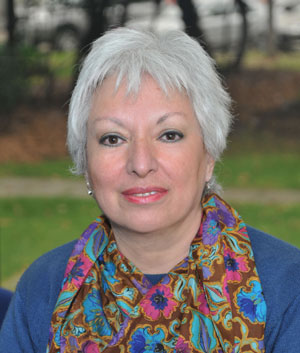Sonia Montaño, Director of ECLAC Division for Gender
Affairs
Gender Equality Observatory:
A Tool for Facing Challenges

Photo: Alejandro Hoppe, ECLAC
In Latin America 31.8% of women do not have their own income. This means that at least 3 in 10 Latin American women do not participate in the labour market, have properties or assets in their name or receive any maintenance, pension or transfers from the State or family members. In summary, they are totally dependent on others.
Only 12.6% of Latin American men are in the same situation.
This inequality and lack of autonomy are mainly the result of injustice and the improper distribution of power, income and time between men and women, as well as the lack of recognition of women’s rights on the part of the political and economic elites.
This could be the first item of data provided by the Gender equality observatory for Latin America and the Caribbean in terms of women’s economic autonomy.
To date, we have not adequately tackled female employment, and this can be seen in all countries with information available. Women spend more time than men on unpaid work (at least one and a half times more). In Mexico, women spend four times longer than men.
A second piece of data on decision-making autonomy indicates that clear progress has been made in terms of women’s political participation.
There are striking cases of women reaching the heights of political power. Chile, Argentina, Costa Rica, Brazil, Trinidad and Tobago and Jamaica have or have recently had women as their political leader.
It is particularly remarkable that this has occurred in the framework of societies with democratic systems. This shows how citizens have accepted and promoted the transfer of substantive political responsibilities towards women.
However, this progress has been slower than expected (for instance, only 8.5% of elected mayors in Latin America are women), and has been unevenly spread throughout the region.
A third piece of data concerns physical autonomy. In 2009, 329 women died at the hands of their partners or former partners in 7 of the region’s countries with information available: 117 in Peru, 79 in the Dominican Republic, 52 in Chile, 27 in Paraguay, 20 in Uruguay, 20 in El Salvador and 14 in Costa Rica.
These three pieces of data, reflecting the three forms of autonomy of women, show their unequal position in relation to their male peers.
These three pillars form the basis of the work of the Gender equality observatory for Latin America and the Caribbean, which has been borne of inter-agency efforts of the United Nations Population Fund (UNFPA), the Pan American Health Organization (PAHO) and the United Nations Entity for Gender Equality and the Empowerment of Women (UN-Women), with the support of the Ibero-American General Secretariat and the Spanish Agency for international development cooperation (AECID).
The Economic Commission for Latin America and the Caribbean (ECLAC) acts as the Technical Secretariat for the Observatory, whose main aim is to follow up the commitments undertaken by countries in terms of gender equality.
This involves activities that include producing gender indicators and analytical tools for policy-making; monitoring the implementation of international agreements: and providing technical support and training to mechanisms for the advancement of women and national statistical institutes that so require.
The 2011 annual report of the Observatory entitled Leap of autonomy, from the margins to the centre provides a fresh view of the progress, setbacks and ongoing issues in terms of the physical, economic and decision-making autonomy of Ibero-American women.
At the Eleventh session of the Regional Conference on Women held in Brasilia in 2010, governments recommended advancing towards greater economic autonomy and equality for women in the labour market; implementing the policies needed to improve the economic and social value attached to unpaid work; strengthening women’s citizenship and increasing their involvement in decision-making processes; and tackling all forms of violence against women.
The Gender equality observatory for Latin America and the Caribbean is definitely a tool for tackling these challenges.
|
|
|
| ECLAC acts as the Technical Secretariat for the Observatory, whose main aim is to follow up the commitments undertaken by countries in terms of gender equality. | |
|
|
|
| The 2011 annual report of the Observatory provides a fresh view of the progress, setbacks and ongoing issues in terms of the physical, economic and decision-making autonomy of Ibero-American women. | |